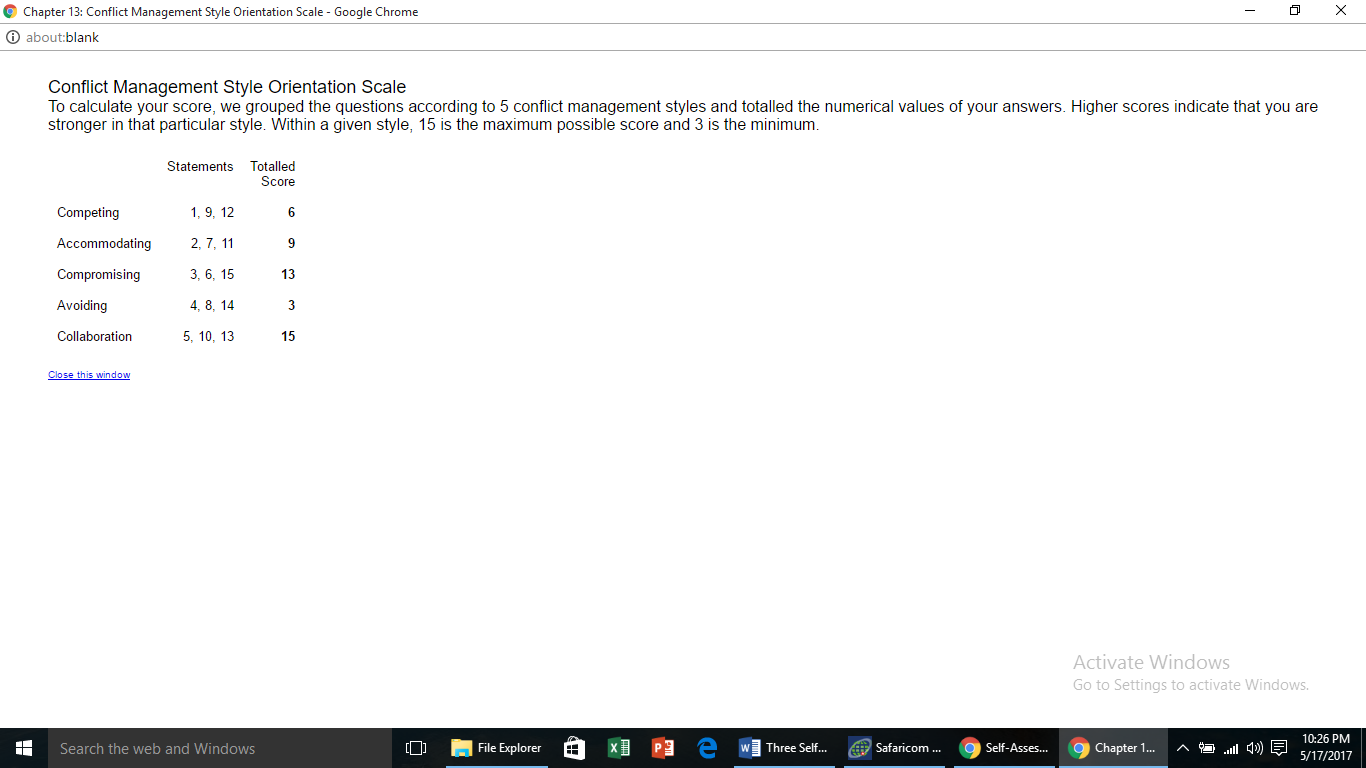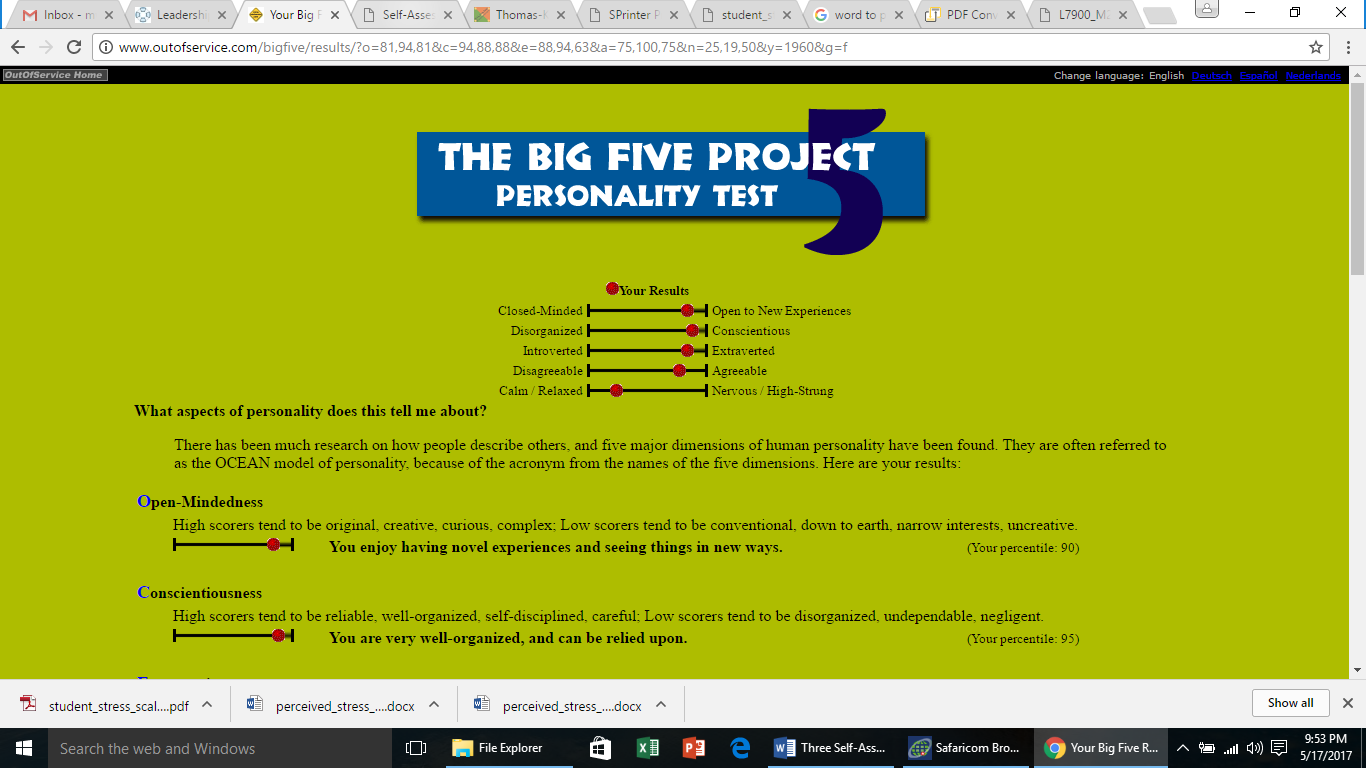Leadership paper Teacher Charles only
Running head: THREE SELF-ASSESSMENTS 0
Three Self-Assessments
Tracey Joseph
Argosy University
Conflict Management_L7900-A01
Dr. Roger Fuller
May/17/2017
Three Self-Assessments
Completing the three self-assessments provided a valuable opportunity for identifying psychosocial information about my own responses to conflict. Some of the main aspects highlighted by the assessments pertained to value conflicts, personality style and conflict management style . The information and insights gleaned from these self-assessments will find meaningful applications in my personal as well as professional life. This paper details the findings from the three self-assessments, outlines some surprising findings and describes the implications of the results to my practice as a conflict manager.
Revi e w
The Values Clarification and Conflict Resolution assessment provided deep insights about my realized and idealized values relating to conflict resolution. Results from this test revealed that for both idealized and realized scores, I often tend to find ways of resolving conflicts in a manner that leads to a win-win resolution and bringing stability to chaotic conflict conditions. In a previous place of employment, a conflict ensued between employees and managers due to appraisal mechanisms that the subordinates considered being unfair. As a member of the management team, I had the responsibility of handling and managing such conflicts. I strived to bring stability to the chaotic conditions through communicating openly with the employees, listening empathetically to their concerns and finding appropriate solutions that were satisfactory to all the parties involved in the conflict. Scores from the Values Clarification and Conflict Resolution assessment also indicated that I have the inclination to seek deeper understanding of problematic issues, providing leadership during the resolution process and demonstrating honest, open communication.
Nonetheless, it is worth mentioning that the assessment also revealed some potential value conflicts. While my realized score in taking risks during the resolution process was (3), the idealized score was (9). Even though I usually take some calculated risks in conflict resolution, I must admit that at times I prefer not taking such risks. For instance, during the conflict between subordinates and managers, I refrained from favoring the existing appraisal system under the reasoning that it would further alienate the employees. Other potential value conflicts as revealed by the Values Clarification and Conflict Resolution assessment included determining the use of power in the resolution process, willingness to give up important things for the sake of resolving the conflict and positioning one’s thinking to influence others’ opinions. Making confrontations when required was the other value conflict based on the low realized score and high score on the idealized domain. This score came as a surprise because I realized some confrontations might be helpful in the conflict resolution process. Overall, the information gained from completing the Values Clarification and Conflict Resolution assessment will be meaningful in my role as a conflict manager. The information will aid me in using power appropriately, engaging all stakeholders involved in the conflict and streamlining communications during the conflict resolution process.
The Conflict Management Style Orientation Scale also offered deep insights especially with regard to my conflict resolution orientation. Results from this scale revealed that my conflict management style tends to be strong in collaboration, compromising and accommodation. In negotiations or disagreements with other individuals, I usually strive to find the best solution that fits both sides through sharing all available information. Shanker (2013) acknowledged that arriving at consensus to find solutions that are beneficial to both parties is critical in the conflict management endeavor. It is important to note that when conflicts arise at the workplace, I always try to investigate them with coworkers in order to arrive at the best solutions that are beneficial to all the parties involved. With regard to accommodation, I sometimes go along with coworkers’ suggestions even if I do not agree with them, however use such suggestions to find a much more productive solution. I accommodated the wishes of individuals who have different viewpoints and I seldom let colleagues have their way instead of jeopardizing our relationship. In disputes, it is important to mention that I always prefer reaching a compromise through giving and taking to find a middle ground.
The Conflict Management Style Orientation Scale also indicated a low score on the dimensions of competing and avoiding. In situations of conflicts, I tend to disagree openly with individuals rather than keeping my opinions to myself. Moreover, when disagreements arise, I often favor debating the issues openly. Coleman, Deutsch, and Marcus (2014) contended that such an approach helps the other party to understand the underlying causes of the tension, after which we can find a way forward to resolve the concern. I also prefer discussing my differences of opinions with others so that we can find an appropriate solution to conflicts or tensions. With respect to the dimension of competing, I rarely defend my position vigorously during arguments, I also have the tendency of giving in when provided accurate information and barely strive to win my position during discussions. In terms of conflicts that I have experienced, the assessment findings perfectly fit with what I believe about myself. The findings shows some meaningful application in my practice as a conflict manager. In resolving conflicts such as an interpersonal conflict I encountered with a colleague due to personality differences, I will strive to involve the other party to find a win-win solution, arrive at consensus, accommodate differing opinions and collaborate whenever necessary.
The Big Five Personality Test similarly revealed some intriguing aspects about my psychosocial personality. The results from this test indicated that I am open to new experiences. This is because I am inclined to be creative, original, complex and curious. I also enjoy seeing things in new perspectives and having novel experiences. Results from the Big Five Personality Test also revealed that I have high level of conscientiousness. This implies that I am motivated to be reliable, self-disciplined, well organized and careful. The test further revealed that I am also prone to be an extrovert. Indeed, I must admit that I am fun loving, talkative, friendly and sociable. The test additionally revealed that I am agreeable and relatively calm. Consistent with these findings, I must admit that I am supportive, courteous, sympathetic and good-natured. Furthermore, I am secure and have the potential to remain calm even during some tense situations. To put it into perspective, my percentile for open-mindedness was 90%, conscientiousness 95%, extraversion 90%, agreeableness 87% and negative emotionality 13%.
Much of the information and finding from this personality test are consistent with what I believe about myself. For example, I am a well-organized individual who values and respects all individuals irrespective of their personal attributes such as gender, age or racial background. Such respect for individuals enabled me to handle the conflict stemming from personality differences more constructively. Nevertheless, a major surprise that stemmed from this test pertains to negative emotionality. I must admit that even though I handle stress well, I sometimes get temperamental particularly when faced with some challenging situations. To handle conflicts constructively, I believe that I need to control my emotions and keep them in check. Hopkins and Yonker (2015) reiterated that developing high levels of emotional intelligence should help individuals to handle conflict well since they are aware of their own emotions as well as the emotions of others. Most of the assessment findings are consistent with what I believe about myself. As a conflict manager, I will strive to develop strong emotional intelligence and exhibit other desirable personality traits that can assist in reconciling differences among parties to the conflict.
Conclusion
The Values Clarification and Conflict Resolution assessment, the Conflict Management Style Orientation Scale and the Big Five Personality Test all provided a wealth of information about my own responses to conflict. Cumulatively, the assessments revealed that my values and personality traits could help me in the management of conflicts that I encounter at the workplace. I intend to integrate all the insights gained from the assessments in order to improve my conflict resolution skills .
Professors comments
I would like to have seen you offer additional critical discussion of the results of each test with more integration and citation of course concepts/terms/theory to demonstrate understanding of such into the assignment.
The paper would have better structure if you had a level one heading for each assessment.
Remember to use two spaces after end of sentence punctuation throughout the body of every paper you write.
References
Coleman, P., Deutsch, M., & Marcus, E. (2014). The handbook of conflict resolution: Theory and practice (3 ed.). San Francisco: Jossey-Bass.
https://digitalbookshelf.argosy.edu/#/books/9781118810323/cfi/6/18!/4/2/14/2@0:0
Hopkins, M., & Yonker, R. (2015). Managing conflict with emotional intelligence: Abilities that make a difference. The Journal of Management Development, 34(2), 226-244. Retrieved from http://search.proquest.com.libproxy.edmc.edu/central/docview/1650519501/BB042456158947D8PQ/5?accountid=34899 retrived on (2017, May, 16)
Shanker, M. (2013). Assessing conflict management styles of managers in relation to profession development: Subordinates perspective. Management Prudence, 4(2), 50-55. Retrieved from http://search.proquest.com.libproxy.edmc.edu/central/docview/1478034656/9542641639EA4608PQ/20?accountid=34899 retrived on (2017, May, 15)
Appendix
Conflict Management Style Orientation

The Big Five Personality Test

| M2_A2 Grading Criteria: Due 5/17/17 (3-6 pages) | Maximum Points |
| Completed the three assessments. | 12 |
| Provided a summary of your findings for each assessment. | 12, 11 |
| Provided any surprises or information that does not seem to fit what you believe about yourself in terms of the assessment findings and conflicts you have experienced. | 12, 11 |
| Provided the implications of the results for yourself as a conflict manager. | 16, 14 |
| Wrote in a clear, concise, and organized manner; demonstrated ethical scholarship in accurate representation and attribution of sources; and displayed accurate spelling, grammar, and punctuation. | 8, 7 |
| Total: | 60, 55 |



